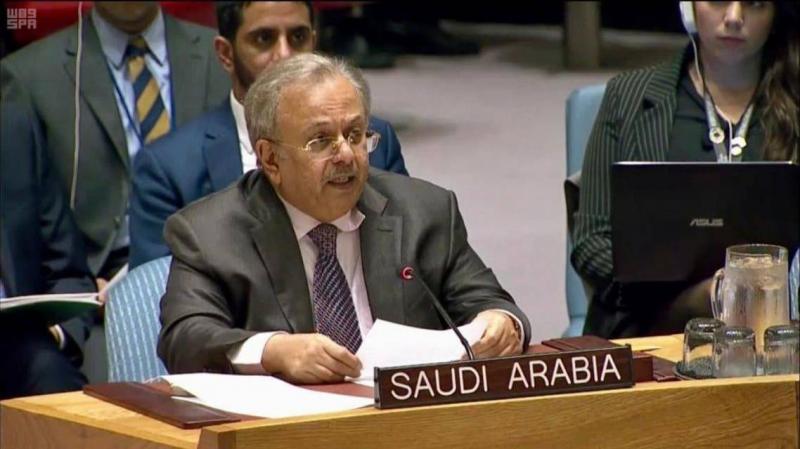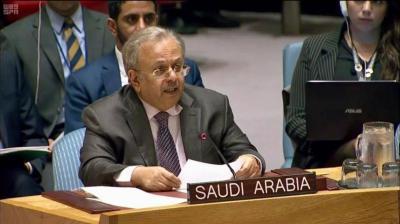The Permanent Representative of Saudi Arabia to the United Nations, Ambassador Abdullah bin Yahya Al-Mualimi, called on Iran to cease spreading tension in the region and expressed concern over the contradictory behavior of Iranian authorities. He emphasized that Saudi Arabia and the countries in the region have been striving for more than 40 years to make the Middle East a zone free of nuclear weapons and other weapons of mass destruction, which is the basis for their support of international efforts to prevent Iran from acquiring nuclear weapons.
In his remarks during the Second Middle East Conference on the establishment of a zone free of nuclear weapons and other weapons of mass destruction, chaired by the Permanent Delegation of the State of Kuwait to the UN, he expressed Saudi Arabia's deep concern regarding Tehran's actions that contradict its claims of peaceful nuclear activities, urging Iran to seize current diplomatic opportunities and engage in serious negotiations regarding its nuclear program instead of further jeopardizing the region's security and stability.
He stressed Riyadh's commitment to achieving the aims of the UN Charter in maintaining the security and safety of peoples worldwide and the principles of the Treaty on the Non-Proliferation of Nuclear Weapons. He also pointed out that Saudi Arabia has been and continues to be at the forefront of countries supporting the establishment of nuclear-weapon-free zones worldwide, especially in the Middle East, which is experiencing turmoil and instability.
He indicated that Saudi Arabia contributed with the Arab group to adopt UN General Assembly Resolution 456/73, which tasked the UN Secretary-General with convening this conference to negotiate a binding treaty to establish a zone free of nuclear weapons and other weapons of mass destruction in the region.
Furthermore, he stated that establishing nuclear-weapon-free zones, including in the Middle East, is a fundamental measure to achieve the UN Charter's purposes and principles related to preserving international peace and security, promoting good neighborliness, friendly relations, and cooperation among states.
He contended that the argument put forth by some countries that the security environment and international conditions are unsuitable for proceeding with the complete removal of weapons of mass destruction in the region is flawed, as everyone seeks this goal except one party—Israel—which continues to obstruct all initiatives and negotiations aimed at establishing a nuclear-weapon-free zone and other weapons of mass destruction.
He pointed out that the failure to achieve universality of the Treaty on the Non-Proliferation of Nuclear Weapons, due to Israel's continued refusal to join it, represents an obstacle that cannot be ignored. The essence of this treaty is to provide non-nuclear states with a security guarantee against the misuse of nuclear technology for weaponry purposes, a guarantee that is absent in the Middle East as long as Israel refuses to join and to subject all its nuclear facilities to the comprehensive safeguards regime of the International Atomic Energy Agency, while defying related international resolutions and disregarding decisions from the Non-Proliferation Treaty review conferences.
He also emphasized that establishing a Middle East free of nuclear weapons and weapons of mass destruction is no longer just an option, but a pressing necessity, as achieving security, stability, and comprehensive coexistence in our region cannot be completed without the removal of all weapons of mass destruction.
Ambassador Al-Mualimi concluded his statement by expressing Saudi Arabia's hope for practical steps to be taken during the conference resulting in positive outcomes, affirming the Saudi delegation's readiness to cooperate with the conference's esteemed presidency and participating countries towards achieving common goals, and moving together steadily towards establishing a Middle East free of nuclear weapons and weapons of mass destruction.
He clarified that Saudi Arabia's accession to international treaties related to the prohibition and prevention of the proliferation of weapons of mass destruction, and agreements concerned with regulating hazardous materials and ways to deal with them, and enhancing cooperation and coordination to protect civilians from their risks—including the Chemical Weapons Convention and the Biological Weapons Convention—reflect the kingdom's steadfast policy aimed at promoting cooperation to prohibit all types of weapons of mass destruction and prevent their proliferation, contributing to efforts to make the Middle East free of these weapons, thus enhancing security and peace at both regional and international levels. He reiterated Riyadh's support for the inalienable right of all states to benefit from nuclear technology for peaceful purposes as stipulated in the Treaty on the Non-Proliferation of Nuclear Weapons, without subjecting this right to any political restrictions.




